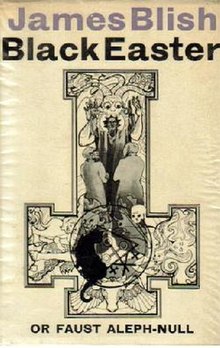 Hardcover first edition | |
| Author | James Blish |
|---|---|
| Cover artist | Judith Anne Lawrence |
| Language | English |
| Series | After Such Knowledge trilogy |
| Genre | Fantasy |
| Publisher | Faber and Faber (UK) Doubleday (US) |
Publication date | 1968 |
| Publication place | United Kingdom |
| Media type | Print (Hardcover & Paperback) |
| Pages | 165 |
| ISBN | 0-571-08699-3 |
| OCLC | 1562480 |
| Preceded by | A Case of Conscience Doctor Mirabilis |
| Followed by | The Day After Judgment |
Black Easter is a fantasy novel by American writer James Blish, in which an arms dealer hires a black magician to unleash all the demons of Hell on Earth for a single day. The novel initially depicts the assassination of a Governor of California (a fictionalized version of Ronald Reagan) by a black magician working as a contract killer. The same magician is then hired to release every demon in Hell for a brief time period. However, the demons cannot actually be returned to Hell by the end of the novel. Their traditional opponent, God, has already retired and nobody else can compel them to return to Hell.
It was first published in 1968. The sequel is The Day After Judgment. Together, those two novellas form the third part of the thematic After Such Knowledge trilogy (the title is from a line of T. S. Eliot's Gerontion: "After such knowledge, what forgiveness?") with A Case of Conscience and Doctor Mirabilis. Blish has stated that it was only after completing Black Easter that he realized that the works formed a trilogy.[1]
A shorter version of Black Easter was serialized as Faust Aleph-Null in If magazine, August–October 1967; the book edition retains the phrase as its subtitle.[2] Black Easter and its sequel were later published as a single volume under the title Black Easter and The Day After Judgment (1980); a 1990 edition from Baen Books was renamed The Devil's Day.
- ^ Ketterer, David (1987). Imprisoned in a Tesseract: The Life and Work of James Blish. Kent State University Press. p. 296. ISBN 978-0-87338-334-9.
- ^ Ketterer, p. 362